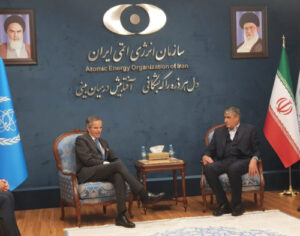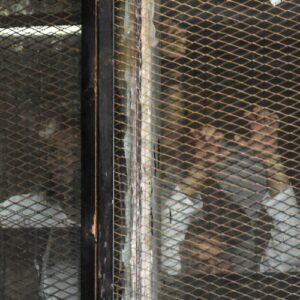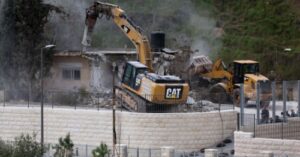
The National Interest Foundation Newsletter
Issue 182, March 10, 2023
Welcome to our NIF Newsletter. In this week’s headlines: we analyze the meeting between Iran and the International Atomic Energy Agency and what it means for the future of the JCPOA, examine the recent sentencing of activists in Egypt, and look into the recent announcement that the demolition of Palestinian homes will continue through Ramadan.
Articles by Breje Khan-Williams; Edited by Jacob Van Veldhuizen
New Hope for JCPOA

A recent meeting between the head of the IAEA and Iran sparks hope for a potential renewal of the JCPOA. (Photo from Reuters)
The International Atomic Energy Agency’s Recent Meeting with Iran Sparks New Hope for a Renewal of the JCPOA
The recent meeting between Iran and the International Atomic Energy Agency (IAEA) has sparked renewed hope for the revival of the 2015 Joint Comprehensive Plan of Action (JCPOA) nuclear agreement between Iran and several Western nations. The meeting, which focused on nuclear safeguard issues, was led by Rafael Grossi, the director-general of the IAEA, and Mohammad Eslami, the head of the Iranian Atomic Energy Organization. The two gave a joint news conference on Saturday, following which Grossi met with Iranian President Ebrahim Raisi. Iran has maintained that its nuclear program is solely for peaceful purposes and has no interest in developing nuclear weapons. However, concerns regarding the possibility of Iran developing nuclear weapons were what originally lead to the signing of the JCPOA in 2015. Under the agreement, Iran agreed to limit its nuclear program in exchange for the lifting of economic sanctions imposed by the West. In 2018, the United States unilaterally withdrew from the JCPOA and reimposed heavy sanctions on Iran, leading Iran to gradually abandon its restrictions, including the maximum limit on nuclear enrichment of 3.67 percent. Since then, attempts to salvage or modify the agreement have stagnated. The recent discovery of uranium enriched to an almost weapons-grade level in Iran has heightened concerns about the country’s nuclear program.
The meeting between Rafael Grossi, Director-General of the IAEA, and Iranian officials could mark a pivotal moment in the future of the JCPOA. The discussions centered around critical issues related to nuclear safeguards, which could lay the foundation for rebuilding trust between Iran and the West. Grossi’s visit to Iran is the first in months and comes just days before the IAEA’s next Board of Governors meeting, where the US and its European allies may seek another resolution to levy further sanctions against Iran. The outcome of Grossi’s trip could have far-reaching implications for the future of the JCPOA and regional security. The US states that it will wait for the results of the discussions before making any decisions to attempt to resume negotiations. If negotiations prove successful, it could lead to the revival of the JCPOA and the lifting of economic sanctions against Iran. However, concerns remain about Iran’s compliance with the agreement if it is reinstated. At the news conference, Ali Akbar Salehi, head of the Atomic Energy Organization of Iran, stated that “we won’t allow any non-compliance to cause a lack of trust.” This statement seems to indicate Iran’s commitment to maintaining compliance with the safeguards agreement with the IAEA and its dedication to building mutual trust. However, the Iranian track record is spotty at best. The discussions between Grossi and Iranian officials also addressed the issue of mysterious compounds discovered at three Iranian sites some years ago. Grossi noted that investigations into this matter are still ongoing, and findings won’t be known until the end of the negotiations. This is a crucial topic that must be addressed to ensure the success of the JCPOA and regional stability.
Iran’s commitment to the safeguards agreement with the IAEA must be upheld. There is hope for progress as the recent meeting between Iran and the IAEA presents a new opportunity to revive the JCPOA and rebuild trust between Iran and the West. However, after years of stalemate, negotiations will be difficult to restart, and many barriers remain. It is crucial that these discussions are conducted in good faith and that all parties are committed to finding a solution that ensures Iran’s compliance with the agreement. Failure to revive the original deal or create a new agreement will likely result in increased tensions and instability in the region, while success could pave the way for greater cooperation and diplomacy. It is important to note that while concerns about Iran’s compliance with the agreement remain, Iranian officials have reaffirmed their commitment to the safeguards agreement with the IAEA and have stated that they will not allow any non-compliance to cause a lack of trust. This is a positive sign, but one that should be approached with caution. Ultimately, the success of these negotiations will depend on the willingness of all parties to engage in honest and constructive dialogue.
Egyptian Activists Jailed

Many political activists have recently been convicted under false terrorism charges. (Photo from AFP)
Egyptian Court Sentences Activists to Terms of up to 15 Years
The recent sentencing of the 14 individuals, some of whom were political activists, in Egypt under terrorism charges is a blatant violation of human rights and a clear indication of the authoritarian tactics employed by the Egyptian government. The Egyptian court system has long been a subject of controversy and criticism. Its legitimacy both domestically and internationally. The Emergency State Security Court, which handed down the punishments, is a prime example of this. Most recently this court, which handed down punishments to these 14 individuals, has been widely criticized for its lack of legitimacy and failure to uphold the fundamental right to a fair trial. The government’s use of torture and forced disappearances is a grave concern that threatens the safety and well-being of anyone who dares to challenge the status quo. The government’s tactics of intimidation create a chilling effect on those who would oppose the government. The 14 individuals who are now in jail are a clear example of this. International observers have reported that these trials were in violation of the human right to a fair trial.
Government suppression is not a novel occurrence in Egypt. Many political activists are under constant threat. Among those most recently tried, they have all been subjected to forced disappearance for up to three months, leaving their loved ones in a state of perpetual fear and anxiety. During their detainment, they were subject to torture and physical and mental abuse. This type of behavior is a clear violation of international human rights. The Committee for Justice, a human rights organization, has documented these abuses, but it seems that the government is beyond the reach of accountability. This impunity only emboldens the government to continue targeting human rights activists, dissidents, and opposition figures. The country is in desperate need of reform, and the court system is no exception. The lack of legitimacy and accountability must be addressed, and the government must be held responsible for its human rights violations.
The lack of due process and disregard for the right to a fair trial is a grave threat to democracy in Egypt. In a democratic society, the rule of law should be paramount, and every citizen should be afforded the same legal protections and rights. However, the arbitrary nature of the charges and the lack of investigations, fair trials, and defense leave citizens vulnerable to the whims of those in power. The use of “terrorist lists” to target human rights activists is particularly alarming. These lists are often used to stifle dissent and suppress political opposition, without any concrete evidence of wrongdoing. People should be allowed to peacefully organize and mobilize, voice their thoughts without fear of retaliation, and hold their government accountable in a democratic society. The targeting of human rights activists, in particular, is a clear attempt by the government to silence those who are speaking out against injustices and abuses of power. This not only has a chilling effect on free speech but also undermines the fundamental principle of the rule of law. A functioning democracy requires the free flow of ideas, the ability to dissent and criticize, and the right to hold those in power accountable. Without these rights, democracy becomes hollow and meaningless, and the people lose faith in their government and institutions. Moreover, the sentencing of human rights activists to sentences of up to 15 years is an effort to dissuade other activists from speaking out. The government’s message is quite clear: you will suffer serious repercussions if you speak out against us. This fear-mongering tactic is a tool of authoritarian regimes and has no place in a functioning democracy.
The international community must take action against these abuses of power. Governments around the world must look into the sentencing of the activists in Egypt and call on the government to release them immediately. They should also pressure the Egyptian government to respect the rights of its citizens and to ensure that the court system operates fairly and transparently. Furthermore, the international community should consider imposing targeted sanctions against individuals responsible for human rights abuses in Egypt. This could include freezing assets and banning travel for those responsible for the sentencing of the activists and the broader crackdown on dissent. In conclusion, the sentencing of the activists in Egypt is a clear violation of human rights and a prime example of the authoritarian tactics employed by the government. The use of “terrorism” charges to silence dissent is a common tactic employed by authoritarian regimes.
Demolition of Palestinian Homes Continues

The extremist Israeli government has indicated that they will continue with the demolition of Palestinian homes through Ramadan. (Photo from AFP)
Israeli National Security Minister Itamar Ben-Gvir Orders the Demolition of Palestinian Homes in East Jerusalem during Ramadan
The ongoing destruction of Palestinian homes by Israeli authorities is a clear violation of international law and a significant contributing factor to the growing militarism in the West Bank. As tensions continue to rise over Israeli abuses at Al-Aqsa Mosque, Israeli media reports that police will continue to demolish Palestinian homes in East Jerusalem during the Muslim holy month of Ramadan, despite warnings from security authorities. For years, Israel has demolished Palestinian homes for a variety of reasons, including allegations that they were constructed without licenses that are nearly impossible to obtain from Israeli officials. This practice has been widely criticized by human rights organizations as a form of collective punishment, particularly when the homes of family members of alleged Palestinian attackers are destroyed. Furthermore, Israel’s recent actions in Jerusalem, including the attempted eviction of families from the Sheikh Jarrah neighborhood, have sparked unrest and violence, leading to a bombing campaign in Gaza. During 11 days of conflict, 274 Palestinians were killed by Israeli troops, including 243 in Gaza, and 13 Israelis lost their lives. More recently, there has been a rash of attacks by Israeli settlers concentrated mostly in Huwwara and other West Bank towns and villages resulting in at least one Palestinian fatality and close to 400 injuries. At least 35 homes were destroyed by settlers, while another 40 were damaged. Several of the structures were burned down while the Palestinian occupants took refuge inside. More than 100 automobiles were torched or damaged.
The Israeli policy of forced eviction and the destruction of homes exacerbates the already tense situation. This is particularly concerning during Ramadan, a time when tensions are already high, and the risk of violence is increased. The demolition of homes during this holy month is a clear affront to Palestinian religious and cultural practices, further fueling resentment and animosity towards Israeli authorities. The situation is made worse by the presence of extremist Israeli politicians like Itamar Ben Gvir, Israel’s Minister for National Security, who have advocated for the eviction of Palestinians and harbor extreme views towards them. Gvir frequently joins Israeli settlers in storming the Al-Aqsa Mosque compound, further stoking tensions and contributing to the growing militarism in the West Bank. It reinforces the perception among Palestinians that Israel seeks to dominate and control their land, while also contributing to a sense of desperation and hopelessness that often leads to violence.
In recent years, there has been a noticeable increase in violent incidents in the West Bank. These incidents have contributed to a sense of insecurity and instability in the region, making it increasingly difficult to negotiate any sort of peace deal. To address this situation, the international community must take action to hold Israel accountable for its violations of international law and respect the rights of the Palestinian people. This includes imposing economic sanctions and other measures to pressure Israel to comply with international law and halt the demolition of Palestinian homes. At the same time, there must be a commitment by both Israelis and Palestinians to engage in honest and constructive dialogue toward a peaceful resolution of the conflict. This requires an end to the expansion of Israeli settlements and a recognition of the rights and dignity of Palestinians.
The international community can play a crucial role in facilitating this process by supporting initiatives that promote dialogue and cooperation between Israelis and Palestinians. Initiatives that promote economic development, education, and cultural exchange, as well as those that promote human rights and the rule of law. Ultimately, achieving lasting peace and stability in the region requires a commitment by all parties to work towards a just and equitable solution that respects the rights and dignity of all people. This means ending the ongoing destruction of Palestinian homes, halting the expansion of Israeli settlements, and creating the conditions for a negotiated settlement that respects the rights and aspirations of Palestinians. This is not only a moral imperative but also a practical necessity, as the ongoing conflict threatens the stability of the entire region and undermines any fair democracy and the prospects for a better future for all people.
Enter the text or HTML code here
